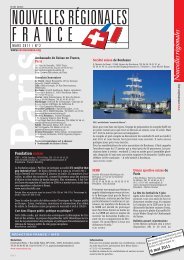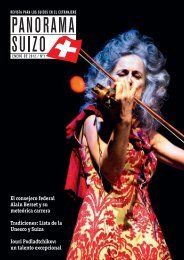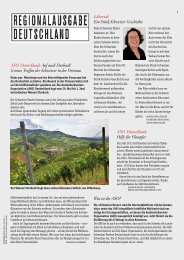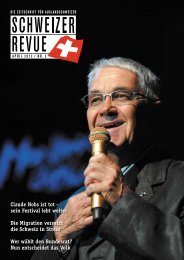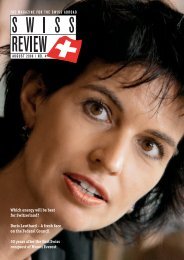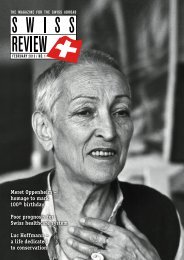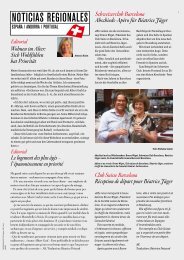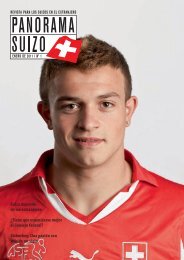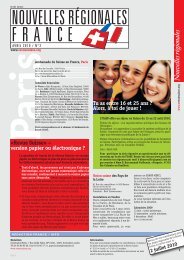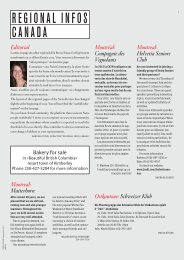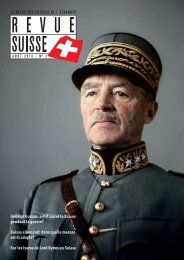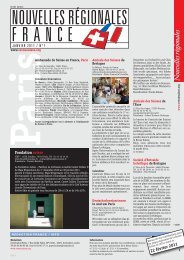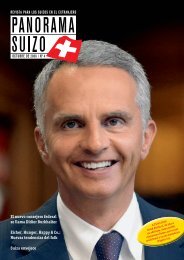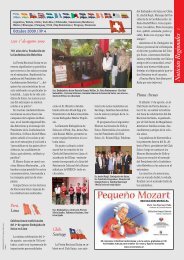Download PDF Swiss Review 3/2013 High ... - Schweizer Revue
Download PDF Swiss Review 3/2013 High ... - Schweizer Revue
Download PDF Swiss Review 3/2013 High ... - Schweizer Revue
Create successful ePaper yourself
Turn your PDF publications into a flip-book with our unique Google optimized e-Paper software.
10<br />
Focus<br />
was 28 years old when she was sworn into the<br />
National Council in December 2003. She was<br />
joined in the National Council four years<br />
later by a second up-and-coming young Liberal<br />
– Christian Wasserfallen. Wasserfallen<br />
benefited from having a prominent name as<br />
the son of the now deceased head of the<br />
Bernese police department. Since the 2011<br />
Berset also helped to improve its image. He<br />
became the youngest President of the Council<br />
of States of all time before being elected<br />
to the Federal Council in December 2011 at<br />
the age of 39.<br />
Reduced in size, the CVP did not manage to<br />
send a National Councillor aged under 30 to<br />
Berne until the 2011 elections. Marco Romano,<br />
August. “He could be my grandfather,” says<br />
Marco Romano. “But it makes no difference –<br />
on the contrary, we share lots of laughs.”<br />
Nadine Masshardt, SP<br />
Raphaël Comte, FDP<br />
Tiana Angelina Moser, GLP<br />
elections, a Liberal has become the youngest<br />
member of the much-vaunted “chambre de<br />
réflexion” – Raphaël Comte from Neuchâtel<br />
was elected to the Council of States shortly<br />
after his 30th birthday. He and Pascale Bruderer,<br />
the Social Democrat from Aargau, are<br />
responsible for ensuring that the smaller<br />
chamber no longer lives up to its traditional<br />
elderly image. The Social Democrat Alain<br />
a young politician from Ticino, was selected for<br />
the National Council in Ticino by the drawing<br />
of lots after he and his internal party opponent<br />
won exactly the same number of votes in the<br />
election. The young star of the CVP now sits<br />
in Berne next to the senior parliamentarian<br />
Jacques Neirynck from Vaud. The former professor<br />
at the Federal Institute of Technology<br />
Lausanne will celebrate his 83rd birthday in<br />
Around 50 on average<br />
The Green Liberals (GLP) stand out on account<br />
of their young faces. This recently established<br />
political party has set itself the objective<br />
of achieving reconciliation between<br />
ecology and the economy. “The phenomenon<br />
that new parties lead to a lowering of the age<br />
of politicians is nothing new,” remarks political<br />
scientist Werner Seitz. “This has occurred<br />
repeatedly in the past irrespective of<br />
whether new parties were right-wing or leftwing.”<br />
In 2007, Tiana Angelina Moser of the<br />
GLP in Zurich entered the National Coun-<br />
<strong>Swiss</strong> <strong>Review</strong> June <strong>2013</strong> / No. 3<br />
Photos: donated<br />
Children, too, get involved in politics<br />
Children and young people are interested in politics. The current<br />
SVP Party President Toni Brunner apparently began reading newspapers<br />
regularly at the age of 12, while the Green Party’s Bernese<br />
National Councillor Aline Trede made her grandmother turn off the<br />
tap when brushing her teeth to save water. However, involvement<br />
is not restricted to such acts. Children and young people can also<br />
take part in the political process. In Switzerland, this happens during<br />
the Youth Session in Berne and at around 50 local and regional<br />
children’s and young people’s parliaments.<br />
In 1991, a Youth Session was held at the Federal Palace for the<br />
first time to mark the 700th anniversary of the confederation. For<br />
once, young people sat in the seats usually occupied by greying<br />
men and a few women in suits. On that occasion, the youngsters<br />
called for better environmental protection, a Switzerland that was<br />
open to the world and showed solidarity, and Switzerland’s rapid<br />
accession to the European Union. The event became an institution<br />
that today has a firm place in the political calendar.<br />
Winning over politicians to support issues<br />
“It is not about getting a taste of life in Berne. It is a question of<br />
political participation,” explains Micha Küchler, project manager<br />
for the Youth Session at the <strong>Swiss</strong> National Youth Council. “I<br />
don’t know of any other country that has anything like this.”<br />
The 200 or so participants, aged between 14 and 21, do not have<br />
a formal right to submit motions but their petitions have the<br />
same status as citizens’ petitions. “The resolutions of the Youth<br />
Session cannot be ignored,” says Küchler.<br />
Another route is via “Juse direct” (Youth Session direct). The<br />
principle is that young people attempt to win over a sitting National<br />
Councillor to support their issues. This was successful in<br />
the case of Lukas Reimann and the ban on private poker games.<br />
The St. Gallen SVP National Councillor submitted a motion to lift<br />
the ban, and private poker games are now permitted again.<br />
Much has also been done in recent years at municipal and cantonal<br />
level to involve young people in politics. There are now<br />
cantonal youth parliaments throughout French-speaking Switzerland,<br />
Ticino and north-western Switzerland, with the exception<br />
of Neuchâtel. They are somewhat thinner on the ground in<br />
central and eastern Switzerland. Aargau, Schaffhausen, Uri and<br />
St. Gallen, along with the two Appenzells, are on board, while<br />
youth sessions take place every three years in Grisons and Thurgau.<br />
Political initiatives to establish youth parliaments are<br />
pending in Berne, Zurich and Lucerne. “We have set ourselves



